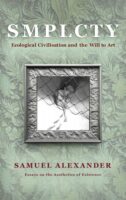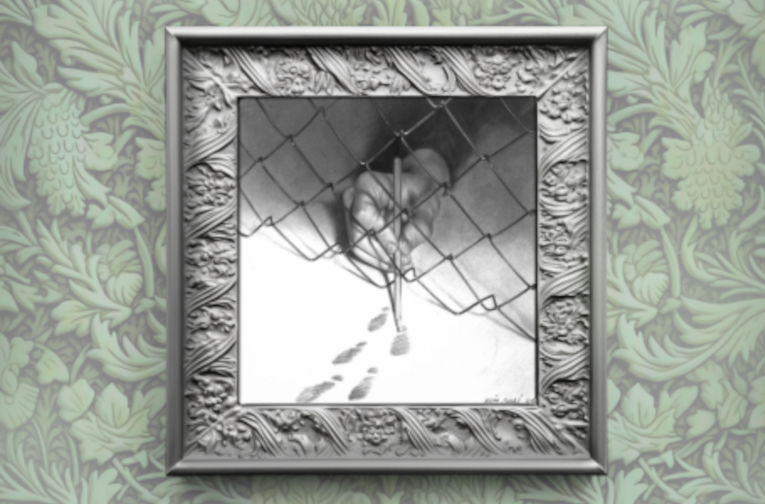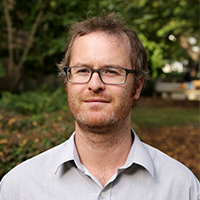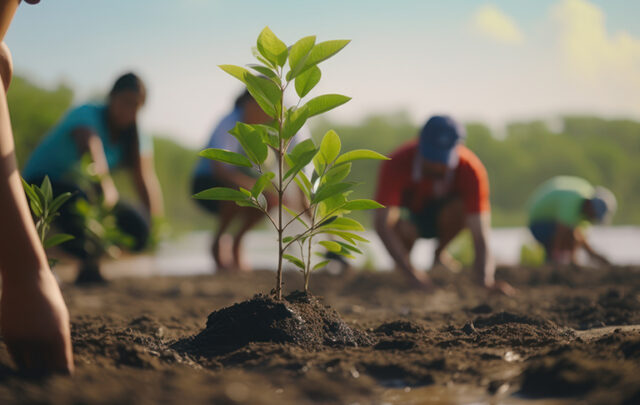Ed. note: In coming weeks we’ll be publishing several chapters from Samuel Alexander’s new collection of essays, SMPLCTY: Ecological Civilisation and the Will to Art. The preface (entitled ‘The Apocalyptic Sublime) was recently published here and below we’ve posted the table of contents and an adapted excerpt from the Introduction.
 The e-book (pdf) is available on a ‘pay what you can’ basis here (edit the price as you wish, including zero) and the paperback is available here, and hardback here.
The e-book (pdf) is available on a ‘pay what you can’ basis here (edit the price as you wish, including zero) and the paperback is available here, and hardback here.
TABLE OF CONTENTS
Preface: The Apocalyptic Sublime
BOOK ONE – THE WILL TO ART
Introduction: The Aesthetic Dimension
The Cosmos as a ‘Readymade’: Dignifying the Aesthetic Universe
Creative Evolution and the Will to Art
Pessimism without Despair: Suffering, Desire, and the Affirmation of Life
An Aesthetic Justification of Existence: The Redemptive Function of Art
Camus on Art and Revolt: Overcoming Nihilism in an Absurd Universe
Rescuing Aestheticism from the Dandies: Critical Distinctions
Homo Aestheticus, the Artful Species: An Evolutionary Perspective
Giving Birth to Oneself: Ethics as an ‘Aesthetics of Existence’
The Politics of Beauty: Schiller on Freedom and Aesthetic Education
BOOK TWO – THE POLITICAL ECONOMY OF ART
Bad Faith and the Fear of Freedom: Can Art Shake Us Awake?
Banish the Poets! The Power and Politics of Aesthetic Education
Making Art While the World Weeps: Political Reflections on Aesthetics
Art Against Empire: Marcuse on the Aesthetics of Revolt
Answering Estragon: Art, Godot, and Utopia
Industrial Aesthetics: A Critique of Taste
Artful Descent: A Cosmodicy of SMPLCTY
Poet-Farmer: A Thoreauvian Aesthetics of Sufficiency
Democratising the Poet: William Morris and the Art of Everyday Life
BOOK THREE – THE AESTHETIC STATE
The Aesthetic State: Toward an Ecological Democracy of Art (forthcoming)
Conclusion: Revisiting The Glass Bead Game (forthcoming)
INTRODUCTION: THE AESTHETIC DIMENSION
This collection of essays presents an aesthetics of existence called the ‘Will to Art’. Readers will be invited to consider the possibility that the universe is fundamentally an aesthetic phenomenon, understood as a process of creative evolution that is moving, albeit agonistically, towards ever-increasing opportunities for artistic expression and aesthetic experience. Art will be defined broadly and openly as the meaningful and pleasurable expression of creative labour, and human experience can be considered ‘aesthetic’ if it flows from the sensuous engagement with art or nature. To speak of the Will to Art is to interpret the world as having an underlying tendency toward artistic and aesthetic flourishing, even though the outcome of this evolutionary process, due to its indeterminate nature, is unknowable in advance.
This is no degeneration into naïve romanticism. Despite the telos of this universe being beauty, the harsh struggle for existence that is evident in our early phase of creative evolution easily disguises the Will to Art as a violent and oppressive Will to Power – not in the Nietzschean sense of power over oneself, but in the sense of an insecure grasping for dominance over the external world. This distortion of the universe’s primal striving leads willing, desiring, and sensuous creatures to pursue their aesthetic potentials in confused, inefficient, and often counterproductive ways. This is because people who are deprived of the power of aesthetic expression can end up expressing themselves in a drive for power. Unnecessary and meaningless suffering is the result.
One only needs to contemplate the profound ugliness of human societies and the many twisted faces that comprise them to see that our collective journey toward beauty and aesthetic freedom is still in its infancy. We are creatures that are currently alienated from our inherent nature as an artful species, seeking some form of aesthetic redemption. My position is that this is the only kind of redemption available to humanity given the death of God and the absence of any alternative metaphysical comforts. As Friedrich Nietzsche declared: it is only as aesthetic phenomena that existence and the world can be justified.
Human beings have a deep existential need both for meaning and beauty in life – a need that resembles the biophysical hunger for food – even if these aesthetic impulses are not always articulated in such grand-sounding terms. Meaning and beauty are more like subconscious, inarticulate yearnings than clearly stated goals. But the more these yearnings for creative expression and aesthetic experience are repressed and denied, the stronger the Will to Art is experienced in our lives, like floodwaters building up behind a dam that is destined to burst. As Marxist philosopher Georg Lukács wrote: ‘The bleaker and emptier life becomes under capitalism, the more intense is the yearning after beauty.’
Two premises guide the development of this vision: first, that material sufficiency is all that is needed for human beings to live rich, meaningful, and artful lives; and second, that material sufficiency is all that is possible, over the long term, on a finite planet in an age of environmental limits. Based on those premises, I will propose and defend a conception of ecological civilisation which I call SMPLCTY.
This is not a utopian prediction about what is a likely future for our species. Rather, it is an orienting vision, designed to guide prefigurative action in the here and now. Individuals and communities can thrive in humble conditions of material sufficiency but cultural richness, meaningfully engaged in pleasurable and creative labour in collaboration with others. In order to know in what direction to move, some understanding is needed regarding the desired destination, even if it turns out that the destination is dauntingly distant.
By removing the ‘i’ from the conventional spelling, the neologism SMPLCTY is intended to evoke a ‘less is more’ philosophy – or rather, a philosophy of ‘just enough is plenty’. This reflects the ethos of sufficiency underpinning the aestheticised form of ecological civilisation that I am inviting readers to consider. The removal of the ‘i’ is also meant to imply the achievement of a diminished egoism (or increased communitarianism) compared to the possessive individualism that has come to define globalised industrial capitalism. Paradoxically, it will be seen that this diminished egoism actually increases opportunities for individual self-creation.
In essence, I will employ SMPLCTY to signify an anarcho-socialist form of life in which human beings minimise material and energetic demands for reasons of social and ecological justice, while creatively exploring the good life in non-materialistic sources of meaning and happiness, especially through art and aesthetic experience. This is supported by an interpretation of the universe as embodying a primordial energy called the Will to Art, which seeks to experience itself through the aesthetic flourishing that would be cultivated in such an ecological civilisation.
Although the energy and resource flows are constrained within this envisioned form of life, the exploration of the good life remains unlimited, in the same way that a pianist is not limited by the 88 keys of a piano. There will never be a time when all the beautiful sonatas have been written, just as there will never be a time when all possible manifestations of beautiful lives have been lived. Upon sufficient and sustainable material foundations – that is, in a political economy that ensures enough, for everyone, forever – human beings are left to explore the aesthetics of their own existence in imaginative ways. Thus we are burdened with the task of applying our own aesthetic values to the spiritual practice of self-fashioning. This is the bounded infinity of human flourishing in an aesthetic universe. Within biophysical limits, and upon sufficient material foundations, we are limited only by our imaginations.
According to this vision, life itself would become an aesthetic project, a never-ending process of creative activity, sensuous experience, aesthetic engagement, and spiritual exploration. Such a society would be structured with the aim of sustainably providing opportunities for all people to find meaning and pleasure through creative labour and aesthetic experience. This form of social order would be defined, not by relations of master and slave, or worker and capitalist, but by the revolving and reciprocal relations of artist and art-lover, a process driven onwards by the Will to Art.
Of course, the concept of art has no stable or determinate ‘essence’, so it is a category that is, and ought to be, contested, challenging, and evolving. As stated above, my working definition – inspired by nineteenth-century artist and philosopher William Morris – is to assume that art broadly refers to the meaningful and pleasurable expression of creative labour. This definition encompasses both the ‘fine arts’ (music, poetry, painting, sculpture, and architecture) and the so-called ‘lesser arts’ of handcraft (carpentry, sewing, pottery, glassware, carving, etc). Building upon Morris, I will defend a societal vision in which art, as defined, becomes integrated into the necessary labours, rituals, and experiences of everyday life. This intentionally blurs the distinction between artist and artisan. I have described such society in my work of fiction, Entropia: Life Beyond Industrial Civilisation (2013), and my four volumes of collected academic essays provide evidential foundations as well as social, political, and economic theories of sufficiency. The present collection of essays seeks to provide philosophical and mythopoetic foundations for the same vision, but through the lens of aesthetics, which I now realise is fundamental.
The Will to Art, as I have introduced it here, is a grand narrative of our universe and humanity’s place in it. Given my sympathies with Nietzschean perspectivism, however, I do not present this vision or cosmodicy as if it were, in any sense, a neutral or objective reading of the world. I believe it to be true, and indeed I experience its truthfulness, but there may be other true theories of existence also – true in the pragmatic sense of being useful for living. This is but one interpretation of an infinitely complex cosmological phenomenon, and because reality is infinitely complex, the human situation is liable to various and competing, even contradictory, interpretations.
To admit that I am engaged in the art of storytelling, however, should not in any way imply that this project resides in the realm of ‘mere fantasy’ or lacks a critical relationship to reality. Every individual and every society are enactments of a story people tell themselves about the nature and purpose of their existence and of the world they live in. The myths and stories we tell ourselves situate us in space and time, shape our perceptions of the present, and guide us as we move into the future, influencing our interpretations of what is possible, proper, and important. Even though we typically embody cultural myths unconsciously, these shared narratives are influential not only in how we think about social and political life but, perhaps more importantly, how we feel about it – and thus how we act. This implies that there is a politics of storytelling – and a politics of art and aesthetics more generally. To acknowledge the political function of story is the first step in exposing the blurry distinction between art, life, and politics, suggesting that there is an inherent aesthetic dimension to life and politics, just as there is a political or even revolutionary potential inherent to certain forms of art or aesthetic practice. These are central themes to be explored.
The essays to follow defend this mythopoetic perspective and explore what might be the proper modes of social, economic, and political organisation for an aesthetic creature such as ours, in a universe such as this. This orientation does not deny or downplay the gruesome violence, humiliating poverty, ecological devastation, and widespread oppression that shapes the contemporary world in so many ways. On the contrary, I am trying to approach such issues from a new angle, in the hope of shedding light on opportunities for social, political, and ecological progress that currently lie in the shadows of dominant modes of thinking.
At once the spectre of ‘aestheticism’ is raised: Will taking an aesthetic perspective on politics lead to what critical theorist Walter Benjamin called an aestheticisation of politics (fascism) or the politicisation of aesthetics (Soviet communism)? The question is fair, but ultimately misdirected. I unconditionally place every member of our species, homo aestheticus, on an equal and egalitarian footing – each having the same right to fashion their life according to their unique creative capacities and sensibilities. Freedom implies constraint, however, both socially and ecologically, which is the never-ending task of politics to manage. And if, as Jacques Rancière asserts, ‘politics is aesthetic in principle’ – a statement to which I will have to return – then it is no objection to a political vision that it is, at base, aesthetic. Mine is simply self-conscious of this inevitability, and I see no reason to try to disguise this fact. The critical issues to be addressed, then, are how politics is aesthetic, to what ends, and for whose benefit.
¨ ¨ ¨
The full introduction is available here (which concludes with short overviews of each essay). The e-book (pdf) is available on a ‘pay what you can’ basis here (edit the price as you wish) and the paperback is available here, and hardback here.






